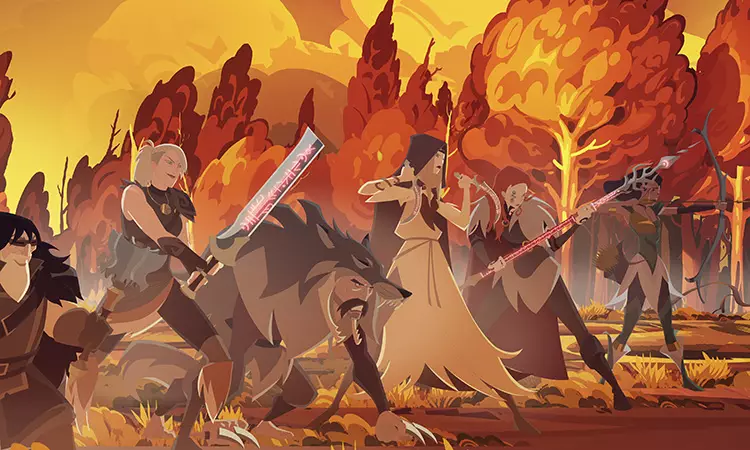On September 19th, Netflix will unveil an audacious new series, *Twilight of the Gods*, under the visionary helm of Zack Snyder. This animated portrayal of Norse mythology promises to breathe fresh life into timeless tales of valor, heartbreak, and divine conflict. Set against a backdrop of fantastical landscapes and epic confrontations, the story introduces viewers to Leif, a mortal king, and Sigrid, a fierce warrior determined to make her mark on the battlegrounds of the gods.
At its core, *Twilight of the Gods* is not just an adaptation of mythological themes but also an intricate love story that unfolds amidst chaos. Leif and Sigrid’s relationship takes center stage, showcasing the complexity and depth of their bond. Snyder emphasizes that character relationships in a series allow for far greater depth than in traditional movies. With the time afforded to develop these characters, viewers will not merely observe their journey; they will engage with their struggles, fears, and desires. The wedding night horror that befalls them at the hands of the god Thor creates a plot that rockets them into an adventure fueled by revenge. This compelling narrative arc is crafted to elicit empathy and excitement, portraying a raw exploration of love steered into a quest for retribution.
Zack Snyder’s fascination with Norse mythology lays the groundwork for this intricate narrative. Familiar with the lore long before this project, Snyder’s personal connection to the subject reflects an authenticity that is infused throughout the series. His exploration raises questions about the nature of gods themselves—whether they are merely abstract representations of human experiences or vibrant beings with personalities that reflect human flaws and tribulations. It’s this duality that makes the gods accessible, and Snyder’s emphasis on character unpredictability sets the stage for dramatic tension and viewer engagement.
The richness of the narrative is echoed in Deborah Snyder’s insights. She highlights the multiple layers of conflict present within the storyline, transcending mere physical battles to explore emotional and moral dilemmas. This is where the animated format finds its strength—allowing for the juxtaposition of love and revenge against the stark brutality of war. The characters brought to life through the voices of talented actors such as Sylvia Hoeks (Sigrid) and Stuart Martin (Leif) provide depth and nuance, making their motivations relatable while immersing viewers in a world filled with giants, dragons, and magic.
The Snyders deftly recognize that while they must meet audience expectations, they also aim to explore themes of sexuality, morality, and existential inquiry. With the series being defined as adult animation, it can push boundaries that traditional mediums often shy away from, allowing for a more nuanced exploration of these themes.
Central to the series is the theme of immortality—a double-edged sword that characters grapple with throughout the narrative. Zack Snyder poses the question: Is immortality a curse or a blessing? As the protagonists navigate their relationships and external conflicts, they are forced to confront these existential dilemmas, creating a dialogue that resonates with viewers beyond the screen. The Snyders’ intention is to deliver a narrative that is not just a mythological expedition, but an exploration of what we would forsake or embrace out of love.
One of the most significant advantages of the animated format, as noted by Zack Snyder, is the control it allows over the visual storytelling. The series’ artistic direction can faithfully reflect the nuances of his vision, framing scenes as he imagines them. This aspect of animation offers a distinct creative freedom that often becomes diluted in live-action portrayals, where interpretation can deviate from the writer’s initial concept.
As *Twilight of the Gods* sets forth its opening chapters, Deborah Snyder hints at the untapped potential within Norse mythology. The series may only skim the surface of a much larger narrative landscape, with opportunities for further exploration of its characters and stories lying ahead. As these characters endure their trials, the possibility for new adventures and realms within this mythic tapestry remains ever-present.
*Twilight of the Gods* emerges as a landmark animated series that intricately weaves themes of love, vengeance, and existential reflection through the vibrant threads of Norse mythology. With its character-driven narrative and Zack Snyder’s unique storytelling vision, audiences can anticipate a gripping experience—one that challenges perceptions, evokes empathy, and ultimately enriches the mythos it seeks to explore. As the series gears up for release, it stands ready to invite viewers into a world that is both familiar and strikingly new.

